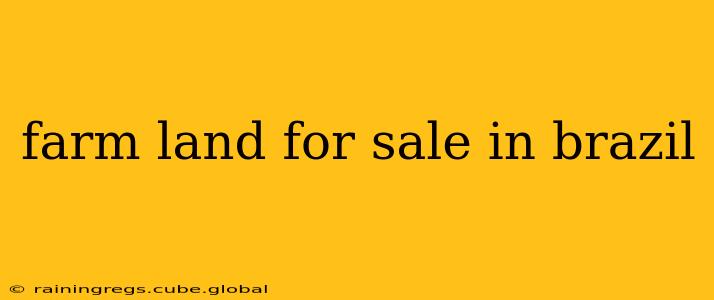Brazil, a vast and diverse country, offers significant opportunities for agricultural investment. With its fertile land, favorable climate in many regions, and growing global demand for agricultural products, farmland in Brazil represents an attractive prospect for both domestic and international investors. However, navigating the Brazilian land market requires careful consideration of various factors. This guide will delve into the key aspects of purchasing farmland in Brazil, addressing common questions and providing valuable insights for potential buyers.
What are the best regions in Brazil for agricultural investment?
The ideal region for agricultural investment in Brazil depends heavily on the type of crop or livestock you intend to raise. Several areas stand out for their agricultural potential:
-
Mato Grosso: Known as the "agricultural powerhouse" of Brazil, Mato Grosso boasts vast expanses of fertile land suitable for soy, corn, and cattle ranching. Its well-established infrastructure and proximity to major transportation routes make it particularly attractive.
-
Mato Grosso do Sul: Similar to Mato Grosso, Mato Grosso do Sul offers significant opportunities for large-scale agricultural operations, particularly in soy and cattle.
-
Paraná: Located in Southern Brazil, Paraná has a more diverse climate and is known for its coffee, soybeans, and wheat production. It also benefits from established infrastructure and access to ports.
-
São Paulo: While more developed and with higher land prices, São Paulo still offers opportunities for specialized agriculture and proximity to major markets.
Ultimately, the "best" region will depend on your specific agricultural goals and investment strategy. Conducting thorough due diligence, including soil analysis and market research, is crucial before making any purchase.
What are the typical costs associated with buying farmland in Brazil?
The cost of farmland in Brazil varies considerably depending on location, soil quality, infrastructure access, and size. Generally, land prices are lower in the central-western regions (like Mato Grosso and Mato Grosso do Sul) than in the more developed southern states. Expect to pay anywhere from a few hundred reais per hectare to several thousand, depending on the factors mentioned above.
Beyond the land purchase price, consider additional costs:
-
Legal fees: Engaging a reputable lawyer specializing in Brazilian land law is essential to ensure a smooth and legally sound transaction.
-
Taxes and registration fees: Various taxes and fees are associated with land registration and transfer of ownership.
-
Infrastructure development: Depending on the condition of the property, you may need to invest in infrastructure improvements, such as roads, irrigation systems, and storage facilities.
What are the legal requirements for buying farmland in Brazil?
Buying farmland in Brazil involves navigating a complex legal landscape. It is absolutely crucial to work with experienced legal professionals throughout the process. Key legal aspects include:
-
Due diligence: Thorough due diligence is paramount to verify land ownership, identify any encumbrances, and ensure compliance with environmental regulations.
-
Environmental permits: Obtaining necessary environmental permits is crucial, especially for large-scale agricultural projects.
-
Land registration: Registering the land purchase with the appropriate authorities is essential to secure ownership.
What are the potential risks involved in buying farmland in Brazil?
While investing in Brazilian farmland offers significant opportunities, potential risks should be carefully considered:
-
Land disputes: Land ownership disputes can be complex and time-consuming in Brazil.
-
Currency fluctuations: The value of the Brazilian Real can fluctuate, impacting the overall return on investment.
-
Political and economic instability: Brazil's political and economic climate can affect agricultural markets and investment returns.
-
Climate change: Climate change poses risks to agricultural production, including drought and extreme weather events.
How can I find farmland for sale in Brazil?
Several avenues exist for finding farmland for sale in Brazil:
-
Real estate agencies: Several real estate agencies specialize in agricultural land sales in Brazil.
-
Online marketplaces: Online platforms list agricultural properties for sale.
-
Networking: Attending agricultural trade shows and networking with industry professionals can lead to potential opportunities.
Remember to exercise caution and conduct thorough due diligence before engaging with any seller or broker.
This guide offers a starting point for understanding the complexities of buying farmland in Brazil. Remember that seeking professional advice from lawyers, accountants, and agricultural specialists is crucial for a successful and risk-mitigated investment. The Brazilian agricultural sector offers great potential, but thorough research and careful planning are essential for navigating this dynamic market effectively.
